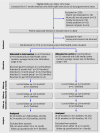Universal parenting programme to prevent early childhood behavioural problems: cluster randomised trial
- PMID: 18244958
- PMCID: PMC2234515
- DOI: 10.1136/bmj.39451.609676.AE
Universal parenting programme to prevent early childhood behavioural problems: cluster randomised trial
Abstract
Objective: To determine whether a parenting programme, offered universally in primary care, can prevent behavioural problems in children and improve parenting and maternal mental health.
Design: Cluster randomised trial.
Setting: 40 primary care nursing centres (clusters) in Victoria, Australia.
Participants: 733 English speaking mothers of 8 month old children sequentially recruited from well child appointments; 656 retained at 24 months.
Intervention: Structured three session programme at age 8-15 months, co-led by well child providers and a parenting expert. The programme covered normal development and behaviour, strategies to increase desired behaviour, and strategies to reduce unwanted behaviour.
Main outcome measures: Maternal report of child externalising behaviour (child behavior checklist 1(1/2)-5 year old), parenting (parent behavior checklist), and maternal mental health (depression anxiety stress scales) at 18 and 24 months.
Results: At 18 months, child behaviour and parenting scores were similar in the two groups. At 24 months, externalising scores in the intervention and control groups were similar (mean 11.9 (SD 7.2) v 12.9 (7.4)); however, on the parent behavior checklist subscale scores, intervention group parents were less likely to report harsh/abusive parenting (mean 38.9 (SD 7.7) v 40.5 (8.8); adjusted mean difference -1.83, 95% confidence interval -3.12 to -0.55) and unreasonable expectations of child development (40.9 (9.9) v 42.7 (9.6); -2.18, -3.74 to -0.62). Mean scores for nurturing parenting and maternal mental health were similar in the two groups at both times.
Conclusions: A universal parenting programme resulted in modest improvement in parenting factors that predict behavioural problems in children but did not reduce externalising behavioural problems or affect maternal mental health at 2 years. Trial registration ISRCTN 77531789.
Conflict of interest statement
Competing interests: None declared.
Figures
Comment in
-
A parenting programme does not affect behavioural problems in toddlers.Evid Based Ment Health. 2008 Nov;11(4):119. doi: 10.1136/ebmh.11.4.119. Evid Based Ment Health. 2008. PMID: 18952968 No abstract available.
References
-
- Sawyer MG, Arney FM, Baghurst PA, Clark JJ, Graetz BW, Kosky RJ, et al. The mental health of young people in Australia Canberra ACT: Mental Health and Special Programs Branch, Commonwealth Department of Health and Aged Care, 2000
-
- Barlow J, Stewart-Brown S. Behaviour problems and group-based parent education programs. J Dev Behav Pediatr 2000;21:356-70. - PubMed
-
- Bor W, Najman JM, O’Callaghan GM, Williams GM, Anstey K. Aggression and the development of delinquent behaviour in children Canberra, ACT: Australian Institute of Criminology, 2001. (Trends and issues in crime and criminal justice series, No 201.)
-
- Campbell S. Behavior problems in preschool children: a review of recent research. J Child Psychol Psychiatry 1995;36:113-49. - PubMed
Publication types
MeSH terms
Associated data
LinkOut - more resources
Full Text Sources
Medical

